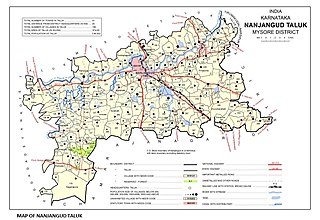
Nanjangud, officially known as Nanjanagudu, is a town in the Mysuru district of Indian state of Karnataka. Nanjangud lies on the banks of the river Kapila, 23 km from the city of Mysore. Nanjangud is famous for the Srikanteshwara Temple located here. Nanjangud is also called Dakshina Kashi. This town is also famous for a type of banana grown in the region called the Nanjanagoodu rasabale. Nanjangud's local administrative unit was designated as a Municipal Committee in 2015 by including Devirammanahalli and Kallahalli village.

Darjeeling tea is a tea made from Camellia sinensis var. sinensis that is grown and processed in Darjeeling district or Kalimpong district in West Bengal, India. Since 2004, the term Darjeeling tea has been a registered geographical indication referring to products produced on certain estates within Darjeeling and Kalimpong. The tea leaves are processed as black tea, though some estates have expanded their product offerings to include leaves suitable for making green, white, and oolong teas.

Banganapalle mangoes is a mango variety produced in Banganapalle of Nandyal District in the Indian state of Andhra Pradesh. It alone occupies 70% percent of total mango cultivable area of the state and was first introduced by the Farmers of Banaganapalli. It was registered as one of the geographical indication from Andhra Pradesh on 3 May 2017, under horticultural products by Geographical Indication Registry. It is also grown in the other parts of India and Pakistan. The fruit is described as obliquely oval in shape, around 20cm in length, with yellow flesh and a thin, smooth yellow skin. The flesh is of a firm, meaty texture and is sweet and lacks fibre. The cultivar is the most sought after in Andhra Pradesh. It is a very late-season variety that is good for canning. This cultivar is a source of vitamin A & C and is also called king of Mangoes.
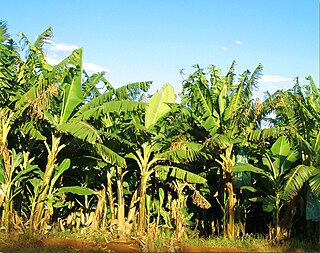
A banana plantation is a commercial agricultural facility found in tropical climates where bananas are grown.
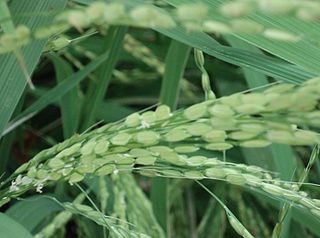
Pokkali is a unique saline tolerant rice variety that is cultivated using extensive aquaculture in an organic way in the water-logged coastal regions, spread in about 5000 hectares area in Alappuzha, Thrissur and Ernakulam districts of Kerala in Southern India. The brand Pokkali has received a GI tag from the Geographical Indications Registry Office, Chennai.
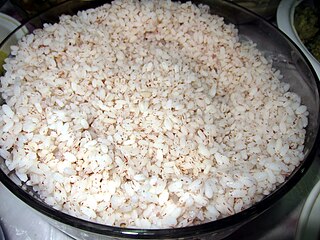
Matta rice is an indigenous variety of rice grown in Udupi and Dakshina Kannada districts of Karnataka, and Palakkad district of Kerala, India. It is known for its coarseness and health benefits. It is popular in Kerala and coastal Karnataka in India and Sri Lanka where it is used on a regular basis for idlies, appams and plain rice; it is different from brown rice.
Guntur Sannam or Capsicum annuum var. longum, is a variety of chili pepper that grows in the districts of Guntur, Prakasam, Warangal (Telangana), and Khammam in India. It is registered as one of the geographical indications of Andhra Pradesh.

Thrissur City Police (TCP), a division of the Kerala Police, is the law enforcement agency for the City of Thrissur, Kunnamkulam and the temple town of Guruvayoor. The city police force is headed by a Commissioner of Police, an IPS officer, and the administrative control vests with the Home Ministry of Kerala. Thrissur City Police is the largest Police District in Kerala state covering an area of 570.79 Square kilometre.

True plantains are a group of cultivars of the genus Musa placed in the African Plantain subgroup of the AAB chromosome group. Although "AAB" and "true plantain" are often used interchangeably, plantains are just the most popular varieties among the AABs. The term "plantain" can refer to all the banana cultivars which are normally eaten after cooking, rather than raw, or it can refer to members of other subgroups of Musa cultivars, such as the Pacific plantains, although in Africa there is little to no distinction made between the two, as both are commonly cooked. True plantains are divided into four groups based on their bunch type: French, French Horn, False Horn, and Horn plantains.
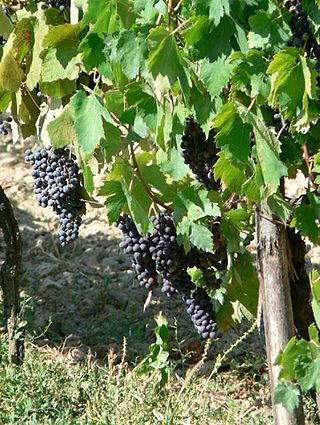
Bangalore blue grape, also simply called Bangalore Blue, is a variety of fox grape grown in districts around Bangalore in India. It is one of the three major varieties of grape in the state of Karnataka. It received a geographical indication tag from the Government of India in 2013.

Udupi Mattu Gulla, or Udupi Matti Gulla, is a variety of green brinjal grown in and around the village of Matti in Udupi, India. It was given the Geographical Indication tag in 2011.
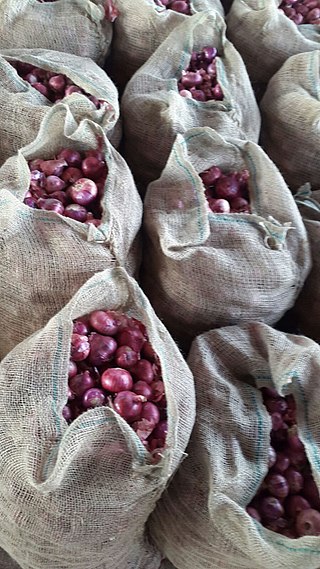
Bangalore rose onion, locally called gulabi eerulli, is a variety of onion grown in and around Bangalore in Karnataka. It got the Geographical Indication tag in 2015.

The Nanjangud banana, natively called as Nanjangud rasabalehannu, is a variety of banana grown in and around the area Mysore district and Chamarajanagar district of Karnataka, India. It is famous for its unique taste and aroma. It was found that the black clay alluvial saline soil found in and around Nanjangud drastically changed the taste and aroma, giving it a particular geographical identity, so it is now registered under geographical indicators under Government of India.

The Devanahalli pomelo is a variety of the citrus fruit pomelo of the family Rutaceae. It is exclusively grown in the region around Devanahalli taluk, Bangalore Rural District, India, as an exotic crop variety. Its officially designated name is "Devanahalli Pomello (Chakkota)"; it is locally known as chakkota.
Kamalapur Red Banana is a special variety of Red banana which is exclusively grown in the valley of Kamalapur village and its surrounding areas in Kalaburagi district of Karnataka, India. It is known as a "rich man's fruit" as it is marketed at a higher price compared to other varieties of banana due to greater inputs in farming with fertilizer, water, and workforce. While its skin is red coloured, the pulp is creamish in colour with an enjoyable taste. It has a high calorie value with Vitamin C and B6, which makes it a health food.
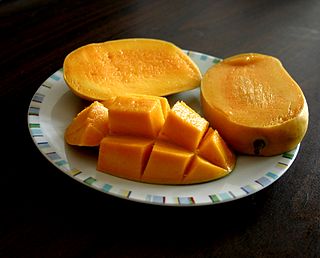
The 'Gir Kesar' mango, also called Kesar, is a mango cultivar grown in the foothills of Girnar in Gujarat, western India. The mango is known for its bright orange colored pulp and was given the geographical indication status in 2011. The biggest market of Gir Kesar is in Talala Gir known as a Mango Market Yard.
Malabar pepper is a variety of black pepper that originated as a chance seedling in a geographical region that now forms part of the present-day state of Kerala in India. The area of production of this variety of pepper now covers all the regions that are part of the Malabar Coast. Malabar pepper was one of the commodities most sought after by the ancient Roman and Arab traders, and later by the early European navigators.
Kotpad Handloom is a vegetable-dyed fabric woven by the tribal weavers of the Mirgan community of Kotpad village in Koraput district, Odisha, India. Cotton sarees with solid border and Pata Anchal, duppatta with typical Buties / motifs, Scolrfs on cotton, silk, handloom stoles, and dress materials are all dyed with organic dyes. The natural dye is manufactured from the aul tree grown in this area. The Kotpad tussar silk saree with tribal art and Kotpad handloom fabrics with natural color is its specialty.

Gandhakasala rice is a variety of rice cultivated by the farmers in Wayanad District in Kerala. This is a scented variety of rice grown mostly by the members of the tribal communities of in Panamaram, Sultan Bathery, and Mananthavady areas in Wayanad. As of 2010, gandhkasala is cultivated in an area of 327 hectares and jeerakasala in 22 hectares.

Nashik valley wines are specially protected under the patent of the Geographical Indication in India for the region of Nashik district in Maharashtra, India, where it is produced from several vineyards and the Sula wine is one of the major producer of Wines in Nashik. The wine is produced in two types: red and white. The district has 52 wineries in operation and consequently Nashik is occasionally known by the epithet "The Wine Capital of India".

















